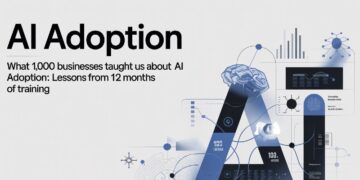Growing faster than ever, AI systems are on the rise and evolving rapidly, so are the ethical concerns regarding data privacy in AI marketing. According to Deloitte’s study, 94% of respondents imagine there is no such thing as a road to success without AI anymore (!!). And in fact SaaS and digital marketing worlds are maintaining with the AI transformation.
AI continues to advance, so do the ethical and privacy concerns surrounding its use in SaaS tools. In this blog post, intersection of information privacy, ethics, and AI in marketing for SaaS platforms shall be examined. We will take a better take a look at the challenges and opportunities of finding the right balance between privacy, innovation, and responsibility for the secure use of AI in the digital marketing landscape.
AI Marketing and the SaaS Space Data Security
AI marketing is marketing powered by artificial intelligence (AI). It automates decision-making based on data and trends. SaaS tools leverage AI Marketing to research data and customer profiles to send personalized messages, create custom ads, and craft data-driven campaigns, all with remarkable efficiency.
In marketing, AI handles tasks without human intervention. Its diverse use cases include data evaluation, natural language processing (NLP), predicting optimal ad placements, automating decision-making, content generation, and real-time personalization.
SaaS tools for agencies are also transformed by this emerging technology. AI is enhancing decision-making and predictive capabilities of SaaS systems.
For instance HubSpot leverages AI in an exemplifying way in sales enablement. According to Supercharge Your Work With HubSpot Page, the SaaS tool uses AI to predict lead closure, suggest optimal email send times, enhance CRM data, and recognize names in live chats, streamlining processes and boosting efficiency.
What is AI Ethics?
AI ethics explores ethical implications of AI use cases and technologies. Though AI is bringing unheard of greatness and opportunities for industries across the globe, it also poses great risk. By examining these vast advantages and risks, AI ethics develops principles and guidelines for the responsible development and implementation of AI.
See below HubSpot Product Manager discuss the ethical concerns of AI.
5 AI Ethics Principles to Reduce Potential Harm
As AI systems began to emerge in every aspect of every industry and streamline processes, the speed of adoption skyrocketed. Within this spree, some businesses don’t consider AI ethics to be vital. This oversight potentially jeopardizes their operations.
To secure protected and rapid AI-powered growth, SaaS leaders must prioritize ethical and responsible AI practices. So that they’ll ensure secure and responsible use while optimizing internal processes.
Here are 5 Key Pilllars of AI ethics,
Transparency
Making sure AI systems are transparent, comprehensible, and explainable is important. Explainability means making AI and ML models easy to grasp. If how AI models work may be explained, keeping processes together and connected may be possible across any AI system user company.
Accountability
It is essential that there’s a responsible address in case of any harm or damage resulting from an AI framework’s actions. Meaning that accountability is an inseparable aspect of AI ethics principles.
Fairness
The fair utilization of AI systems is a core principle of AI ethics. Organizations are compelled to create and employ AI with none bias that may result in any type of discrimination. This principle prevents autonomous decision-making from causing prejudice.
Reliability
AI ought to be reliable. With ever-evolving data sources, ongoing monitoring and validation of AI/ML outputs are essential to maintain up with the changing data sources. As AI/ML sees broader implementation, algorithm reliability becomes much more crucial as a consequence of its extensive application across the enterprise.
Privacy & Security
The growing tech security concern shouldn’t be coming out of the blue, there are increasing attacks that focus on organizations and sensitive data. Safeguarding AI systems against these threats and being prepared for potential risks are essential to construct customer trust and to safeguard internal assets.
What’s the Importance of AI Ethics?
Ethical consideration in AI is crucial to forestall technology from being misused. Without a solid ethical foundation, artificial intelligence can result in privacy violations, unfair bias, and other unexpected risks. In fact, AI ethics holds an important role in the SaaS industry for several compelling reasons.
First and foremost, it acts as a safeguard for the secure development of AI algorithms. The absence of clear ethical guidelines leaves firms exposed to issues related to privacy and confidentiality. Your responsibility extends to safeguarding the data originating out of your customers, a fundamental aspect of maintaining trust.
Moreover, embracing AI ethics shouldn’t be nearly responsible development but in addition about avoiding legal issues. Governments worldwide are increasingly concerned about AI’s impact on consumer data and privacy. Failure to comply may end up in significant fines and, in some cases, even bans or restrictions on AI tools and algorithms that violate terms of service.
In summary, the ethical foundation of AI shouldn’t be only an ethical imperative but in addition a practical necessity in a world where the misuse of technology can have far-reaching consequences.
AI and Data Privacy Concerns: Ensuring Responsible Use
Integrating AI tools into SaaS solutions holds immense potential for businesses, yet there are challenges to look out for. Now it’s more vital than ever to acknowledge ethical considerations related to this technology.
The concerns regarding ethical and responsible use of AI varies. First there may be the potential for AI algorithms to introduce bias. This bias can result in unfair outcomes, particularly concerning in applications like hiring or loan processing, where marginalized groups could also be adversely affected.
Additionally, AI’s reliance on extensive data raises privacy and data protection concerns, particularly in sensitive domains reminiscent of healthcare. SaaS firms must prioritize transparency and robust data protection practices to safeguard user data.
Invasion of privacy
AI serves as a priceless and efficient tool, but it surely doesn’t at all times guarantee the protection of the information it utilizes for improvement.Ethical concerns regarding the invasion of privacy, involves collecting, using, and sharing personal information without permission. AI marketing can collect data from sources like social media, web history, and personal devices, often without individuals’ awareness or consent.
The collected data may be used to create personalized ads. Yet these targeted ads and messages could overwhelm customers and feel invasive. The owner of the data at all times has the right to know the collection processes and the uses of their data.
There is one other risk to look out for regarding invasion of privacy. The protected data could fall into the flawed hands. In that case, privacy breaches, fraud, legal disputes, and even identity theft can occur. What firms could do to forestall privacy invasion is to be open about their data collection methods. To be respectful of people’ privacy, they have to follow data protection rules, and safeguard personal information.
Data Security
In AI marketing data usage is vital. So the key have to be kept protected and secure. Data security means protecting data from unauthorized access, alteration, or disclosure, each in storage and during transmission.
In addition, the extent of non-public data shared unknowingly by users for AI solutions stays undisclosed. There is a likelihood the data used involves unauthorized use of mental property.
To achieve data security, there are several measures that may be taken,
Strong Authentication Measures
Implementing robust authentication methods, including multi-factor authentication and periodic password changes are crucial. These measures act as a barrier to unauthorized access, safeguarding sensitive data.
Data Encryption
Employing data encryption techniques, which involve converting data into a fancy, unreadable format using algorithms adds a layer of protection. This measure makes it considerably harder for unwanted actors to access protected data.
Regular Data Backups
Ensuring data resilience by frequently backing up data have to be a priority. Keeping backups up-to-date ensures no data is lost in case there may be a security breach or a system failure. Organizations must have a well-defined plan for restoring data in such circumstances, minimizing potential data loss.
Security Audits and Reviews
To discover weaknesses and vulnerable spot points of your AI system’s security practices, conducting regular security audits and reviews is a must. This proactive approach helps in pinpointing potential security threats and ensures that data security practices remain current and effective, fortifying your overall security posture.
Bias and Discrimination
In the dynamic world of AI-driven SaaS marketing, tackling bias and discrimination is pivotal to make sure a secure use of AI. There are several strategies you need to use to make sure success.
Assemble a Diverse Team
A team that’s qualified to discover biases is a must. Without identifying and issue, prevention shouldn’t be possible. An expert team that may detect possible biases can prevent discrimination from occuring.
Train Your Systems a Diverse Data
An AI model or system works and generates with the data it has been trained with. Feeding your AI systems with diverse training data is important in order that the AI system could make unbiased decisions.
Keep Audits and Examinations In Check
Regular audits keep algorithms and data in check. It is crucial to run constant examinations and is a superb strategy to forestall bias and discrimination. Further, working transparent algorithms are a well-accepted method to forestall hidden biases.
Regulating AI Ethics and Data Privacy in Marketing
The existing rules that govern AI marketing are supposed to protect people’s privacy. There exists each local and global regulations like General Data Protection Regulation (GDPR), the California Consumer Privacy Act (CCPA), and the Fair Credit Reporting Act (FCRA). With the continuous growth of AI and similar technologies, we are able to expect more government regulations to come back into effect. As AI becomes more integrated into our each day lives, the significance of AI ethics is increasingly vital for digital literacy.
New Regulations to Ensure Compliance are Necessary
AI marketing is advancing rapidly. The marketing and SaaS industries need latest rules and regulations to guard people’s privacy and prevent discrimination -among other concerns regarding responsible use of AI. New regulations should address data security, algorithmic bias, and transparency. Whatever the latest regulations are, they ought to be flexible to adapt to future developments.
In order to make AI algorithms used in promoting transparent, firms should explain how their AI systems work. It is best in the event that they disclose what data they use to make decisions. This may also help prevent bias.
Another issue is data breaches, and to forestall them data security is important.Upcoming regulations supposedly will aim at protecting consumer privacy by limiting the amount of non-public data collected for promoting.
Educating marketers, SaaS stakeholders, and other AI-users have to be a top priority for regulation makers. Education about the ethical use of AI in promoting can encourage firms to enhance their practices and policies for responsible AI marketing.
In order to balance personalization and privacy AI marketing regulations are a must. Transparency, privacy protection, data security, and education are key steps regulators should and probably will take as AI ethics continues to play an important role in digital literacy.
AI Ethical Issues: A Challenge or an Advantage?
The challenge is great: using AI ethically. Yet it is vitally rewarding each for the world as a complete and for businesses. The incorporation of ethical AI practices holds significant benefits.
One of the biggest benefits is enhanced trustworthiness and privacy protection. Building trust for AI systems can reshape people’s perceptions of AI. This way transparency and comprehensible disclosures might be made a regular industry practice.
Building an unbiased future is a bonus that can’t be missed. Addressing the issue of unfair bias is feasible through ensuring that AI systems operate with equity. Equitable models avoid harmful biases that result in discrimination and goal vulnerable groups or individuals.
Last but not the least, promoting universal value alignment inside AI development fosters a typical framework that upholds ethical standards, guiding how humans interact with this technology.
Read the full article here













